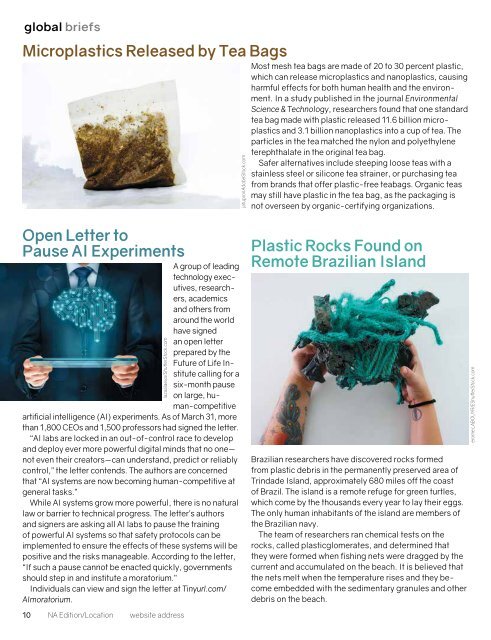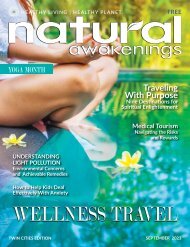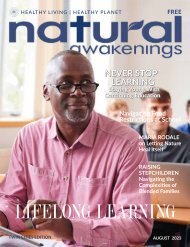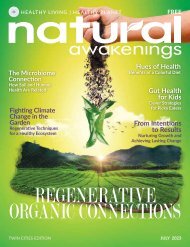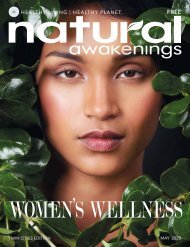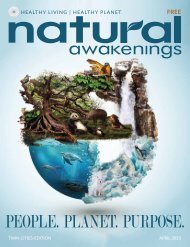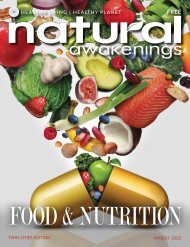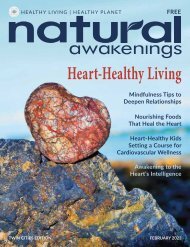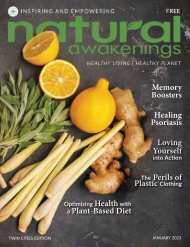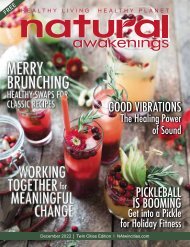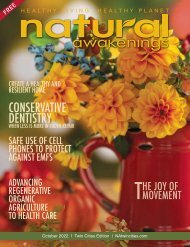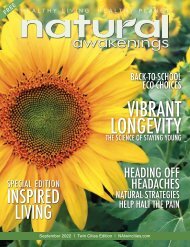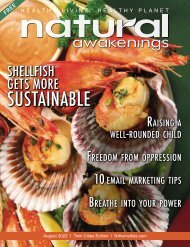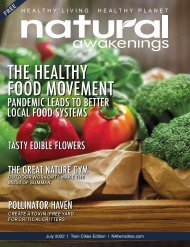Natural Awakenings Twin Cities June 2023
Read the June 2023 edition of Natural Awakenings Twin Cities magazine. This is our annual Men's Health Issue which features articles on taking conscious fatherhood, sexual vitality at every age, choosing sustainable stocks and mutual funds, living healthy to 100 and beyond, water consumption, rise in children with autism, artificial intelligence and so much more! Be sure to check out our local content, including News Brief announcements, Community Resource Guide with providers throughout the metro who can meet your individual wellness needs, and all the happenings in the Calendar of Events. There is additional online-only content that can be found at NATwinCities.com.
Read the June 2023 edition of Natural Awakenings Twin Cities magazine. This is our annual Men's Health Issue which features articles on taking conscious fatherhood, sexual vitality at every age, choosing sustainable stocks and mutual funds, living healthy to 100 and beyond, water consumption, rise in children with autism, artificial intelligence and so much more!
Be sure to check out our local content, including News Brief announcements, Community Resource Guide with providers throughout the metro who can meet your individual wellness needs, and all the happenings in the Calendar of Events. There is additional online-only content that can be found at NATwinCities.com.
You also want an ePaper? Increase the reach of your titles
YUMPU automatically turns print PDFs into web optimized ePapers that Google loves.
global briefs<br />
Microplastics Released by Tea Bags<br />
Most mesh tea bags are made of 20 to 30 percent plastic,<br />
which can release microplastics and nanoplastics, causing<br />
harmful effects for both human health and the environment.<br />
In a study published in the journal Environmental<br />
Science & Technology, researchers found that one standard<br />
tea bag made with plastic released 11.6 billion microplastics<br />
and 3.1 billion nanoplastics into a cup of tea. The<br />
particles in the tea matched the nylon and polyethylene<br />
terephthalate in the original tea bag.<br />
Safer alternatives include steeping loose teas with a<br />
stainless steel or silicone tea strainer, or purchasing tea<br />
from brands that offer plastic-free teabags. Organic teas<br />
jatupronAdobeStock.com<br />
may still have plastic in the tea bag, as the packaging is<br />
not overseen by organic-certifying organizations.<br />
Open Letter to<br />
Pause AI Experiments<br />
A group of leading<br />
technology executives,<br />
researchers,<br />
academics<br />
and others from<br />
around the world<br />
have signed<br />
an open letter<br />
prepared by the<br />
Future of Life Institute<br />
calling for a<br />
six-month pause<br />
on large, human-competitive<br />
artificial intelligence (AI) experiments. As of March 31, more<br />
than 1,800 CEOs and 1,500 professors had signed the letter.<br />
“AI labs are locked in an out-of-control race to develop<br />
and deploy ever more powerful digital minds that no one—<br />
not even their creators—can understand, predict or reliably<br />
control,” the letter contends. The authors are concerned<br />
that “AI systems are now becoming human-competitive at<br />
general tasks.”<br />
While AI systems grow more powerful, there is no natural<br />
law or barrier to technical progress. The letter’s authors<br />
and signers are asking all AI labs to pause the training<br />
of powerful AI systems so that safety protocols can be<br />
implemented to ensure the effects of these systems will be<br />
positive and the risks manageable. According to the letter,<br />
“If such a pause cannot be enacted quickly, governments<br />
should step in and institute a moratorium.”<br />
Individuals can view and sign the letter at Tinyurl.com/<br />
AImoratorium.<br />
lazaalaexa/ShutterStock.com<br />
Plastic Rocks Found on<br />
Remote Brazilian Island<br />
Brazilian researchers have discovered rocks formed<br />
from plastic debris in the permanently preserved area of<br />
Trindade Island, approximately 680 miles off the coast<br />
of Brazil. The island is a remote refuge for green turtles,<br />
which come by the thousands every year to lay their eggs.<br />
The only human inhabitants of the island are members of<br />
the Brazilian navy.<br />
The team of researchers ran chemical tests on the<br />
rocks, called plasticglomerates, and determined that<br />
they were formed when fishing nets were dragged by the<br />
current and accumulated on the beach. It is believed that<br />
the nets melt when the temperature rises and they become<br />
embedded with the sedimentary granules and other<br />
debris on the beach.<br />
erome LABOUYRIEShutterStock.com<br />
10 NA Edition/Location website address


